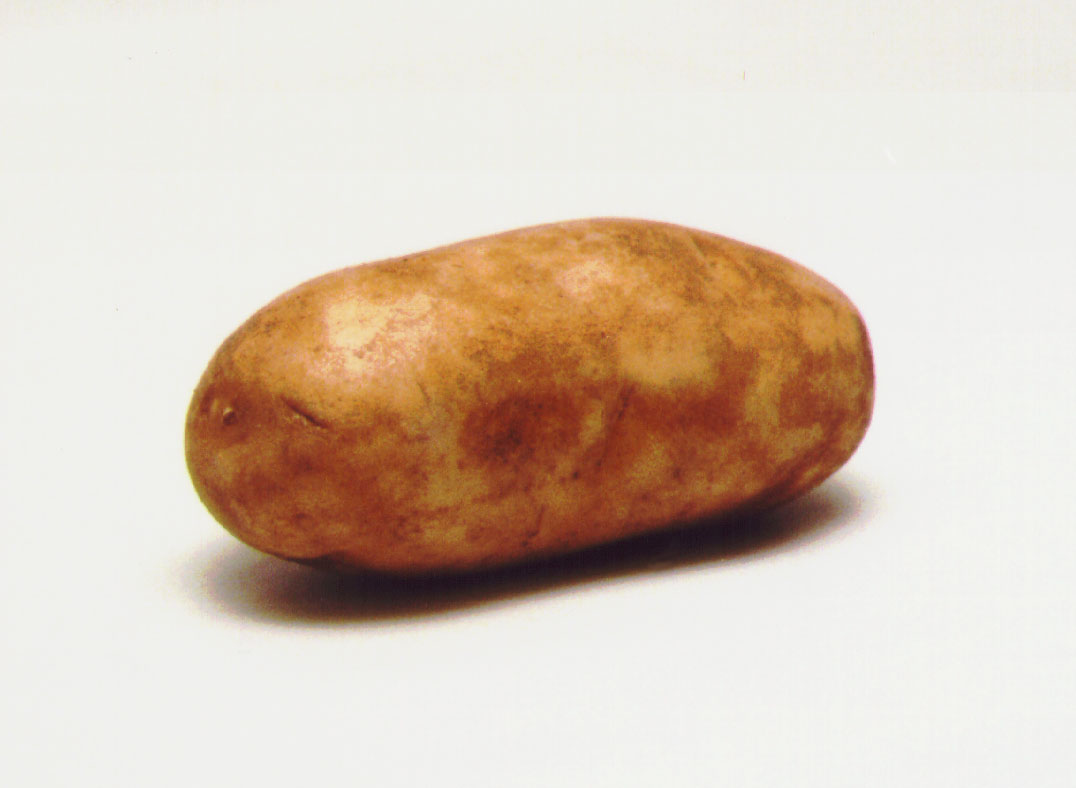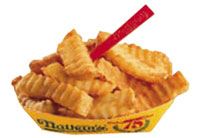Out There: April 2008 Archives
 If, as has been irrefutably shown, restaurants are theater, then it follows that food is part of the entertainment. Usually, when the marriage of food and arts is trotted out, the dog-eared Western menu automatically opens to glutton Petronius, food-face Arcimboldo, and sundry other library-cafeteria standards. But we 21st-century eaters out there should have our own edible cast -- and not so long ago, the nightly news, sourcing YouTube, provided not just one, but a "Spudding Taternacle Choir" of potatoes, in a video (by John Porter McMeans and Cheryl Wheeler) called The Potato Song.
If, as has been irrefutably shown, restaurants are theater, then it follows that food is part of the entertainment. Usually, when the marriage of food and arts is trotted out, the dog-eared Western menu automatically opens to glutton Petronius, food-face Arcimboldo, and sundry other library-cafeteria standards. But we 21st-century eaters out there should have our own edible cast -- and not so long ago, the nightly news, sourcing YouTube, provided not just one, but a "Spudding Taternacle Choir" of potatoes, in a video (by John Porter McMeans and Cheryl Wheeler) called The Potato Song.
Sure, a line from the lyrics -- "They have eyes, but they do not have faces" -- does link to the Franju film masterpiece, Eyes Without a Face, but that's another story. Boomers may also recall that potatoes do indeed have faces, male and female, if the dog hasn't eaten the plastic lips or mustache.
The video was used because, in case you didn't know, the United Nations has declared 2008 to be the International Year of the Potato. For some of us, every year is the year of the potato, but the U.N. honors the tuber now because the rice-wheat-maize cereal trinity is in trouble. Drought in Australia and marketing greed has left the developing world in a rice crisis. In the U.S., bakeries scrawl signs explaining that the elevated price of flour adds a buck a loaf; pizzerias are demanding four bits more a slice. Soybeans for fuel bump corn for feed. So someone in a moderately high place decided that what had been a naked commodity-trader fact should be dressed up and set on a cultural platform:
The world potato sector is undergoing major changes. Until the early 1990s, most potatoes were grown and consumed in Europe, North America and countries of the former Soviet Union. Since then, there has been a dramatic increase in potato production and demand in Asia, Africa and Latin America, where output rose from less than 30 million tonnes in the early 1960s to more than 165 million tonnes in 2007.
Therefore, potatoes are:
Food of the future. The International Year of the Potato is raising awareness of the key role played by the "humble tuber" in agriculture, the economy and world food security. But it also has a very practical aim: to promote development of sustainable potato-based systems that enhance the well-being of producers and consumers and help realize the potato's full potential as a "food of the future."
You'll never guess which country grows the most potatoes. Not the U.S. (fifth) or Russia (second). It's China. Are those spuds for McDonald's restaurants in Beijing, Shanghai? Partly, yes; more for export. But the un-yam is increasingly popular in inland Northern and Central China, used for recipes that make the most of the ingredient's long-treasured ability to straddle the flavor line between vehicle and passenger.
Potatoes are this year's rice.
Potato Madeleines
My father, who seldom spoke about his Brooklyn yute, told me that he and his roughie pals each put a raw potato into a tin can in which holes had been punched and strings attached. Then they added a burning piece of coal (!) or wood and swung the can around and around, sparks flying, until the skin was black and the white inside exploded. What kind of potato was it, I asked, how did it taste? He didn't remember, but said how much fun it was and that the potatoes were filched from the stand at the corner. Of course, I shouldn't do anything like that.
 French fry dilemma: Nathan's or McDonald's? Fat, ridged, savory, enough flesh inside to scrape with your tongue and let the steam of fatted starch flood your mouth. Date: very early '50s. Coney Island, still festive, was close to where we lived. Nothing could be more special, a gift from Daddy just to me, but dozens of others, with identical smiles, are eating exactly the same thing -- a little boy's first lesson in social paradox.
French fry dilemma: Nathan's or McDonald's? Fat, ridged, savory, enough flesh inside to scrape with your tongue and let the steam of fatted starch flood your mouth. Date: very early '50s. Coney Island, still festive, was close to where we lived. Nothing could be more special, a gift from Daddy just to me, but dozens of others, with identical smiles, are eating exactly the same thing -- a little boy's first lesson in social paradox.
Next lesson came in a car with richer relatives, on a drive to a brand new burger place, not an old, tired White Castle (whose multiple hamburger summaries I loved), but something jazzy and suburban, the first of its kind on Long Island. Here, take this ... and cousin Rusty pushed a hot bag bulging with shiny, skinny sticks into my face. When I delicately plucked out a single one, a bunch fell into my lap, staining my chinos. Heat! Salt! And a tease of my friend the potato waving goodbye. Date: later '50s, post-Elvis, pre-Beatles. Which fry was I -- or could I be both?
I had, coincidentally, just finished a book about the Great Potato Famine. Jackie O. kept her weight down and spirits up with a glittering supper of a single baked and slit Idaho topped with Beluga: tiny obsidian eggs growing on the edges of a big brown one. When I went to the basket under the San Diego sink to get a potato for one of my student-poverty lunches (should his father's son filch some caviar from the shop around the corner?), my hand felt something slimy. As I grabbed, the hard part collapsed, and the wild smell that erupted from the dark shocked me to near oblivion. How could something so predictable, so bland, become home to such complete and fetid corruption?
When I revived I saw that the surrounding potatoes were unaffected, and if I could forget how close they had been to the devil, would be boiled and buttered soon. Yes, I thought, still shaken, there's a lesson in this somewhere.

For an automatic alert when there is a new Out There post, email jiweinste@aol.com.
Blogroll
AJ Ads
AJ Blogs
AJBlogCentral | rssculture
Terry Teachout on the arts in New York City
Andrew Taylor on the business of arts & culture
rock culture approximately
Laura Collins-Hughes on arts, culture and coverage
Richard Kessler on arts education
Douglas McLennan's blog
Dalouge Smith advocates for the Arts
Art from the American Outback
For immediate release: the arts are marketable
No genre is the new genre
David Jays on theatre and dance
Paul Levy measures the Angles
Judith H. Dobrzynski on Culture
John Rockwell on the arts
Jan Herman - arts, media & culture with 'tude
dance
Apollinaire Scherr talks about dance
Tobi Tobias on dance et al...
jazz
Howard Mandel's freelance Urban Improvisation
Focus on New Orleans. Jazz and Other Sounds
Doug Ramsey on Jazz and other matters...
media
Jeff Weinstein's Cultural Mixology
Martha Bayles on Film...
classical music
Fresh ideas on building arts communities
Greg Sandow performs a book-in-progress
Exploring Orchestras w/ Henry Fogel
Harvey Sachs on music, and various digressions
Bruce Brubaker on all things Piano
Kyle Gann on music after the fact
Greg Sandow on the future of Classical Music
Norman Lebrecht on Shifting Sound Worlds
publishing
Jerome Weeks on Books
Scott McLemee on books, ideas & trash-culture ephemera
theatre
Wendy Rosenfield: covering drama, onstage and off
Chloe Veltman on how culture will save the world
visual
Public Art, Public Space
Regina Hackett takes her Art To Go
John Perreault's art diary
Lee Rosenbaum's Cultural Commentary
Tyler Green's modern & contemporary art blog
